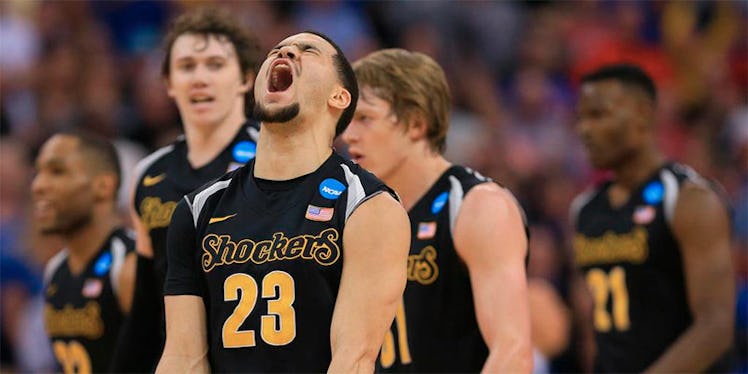
There's A Scientific Reason We Love Rooting For March Madness Underdogs
In some ways, our love for March Madness underdogs is counterintuitive.
Neutral fans love to see the plucky team with the mediocre track record get a win.
But, those wins usually come at the expense of teams that have been more consistent over a longer period of time and thus, as conventional wisdom would suggest, are more deserving.
We root hard for the Cinderella squad with the no-name players, but the juggernaut teams usually carry the players more equipped to entertain us.
After all, sports are about entertainment.
Run of Play's Kári Tulinius summed up this sort of upside-down logic pretty succinctly:
Underdogs are inherently contradictory: They’re the unfancied team everyone fancies.
Rest assured, we all become fans of shock value teams, like Wichita State, when they unseat giants, like Kansas.
So, what is exactly behind that contradiction, and why do we so easily cling to underdogs? As is the case with most questions, science has the answer, and it's multifaceted.
Psychology Proves It's The American Thing To Do
According to a study conducted by the Journal of Consumer Research in 2009, cultural identity is a factor that plays into our inclination to root for the underdog.
The Boston-area professors who conducted the study wrote:
American culture, laws, and social norms enable and encourage underdogs to prosper, in contrast to other nations where an individual’s passion and determination may do little to combat rigid class or caste structures which favor the status-endowed.
The professors hypothesized the idea of the American Dream, which implies an individual's ability to defy all odds through sheer will, makes Americans more inclined to buy into underdog narratives. And their research, to an extent, backs up that claim.
Americans love to see an underdog can prevail -- regardless of the endowment, numbers of blue-chip recruits or ranking of the opponent.
In some ways, it validates the rags-to-riches narrative that's so pervasive in our society.
It's no wonder then, when tourney time comes around, why we become big fans of the mere idea of smaller teams pulling off big upsets.
It's The Most Emotionally Satisfying Way To Watch The Tournament
A study conducted by two researchers at the University of Richmond alluded to the low emotional cost of rooting for underdogs.
In the study, researchers Scott T. Allison and Jeni L. Burnette stated:
We suspect that the prevalence of ath-letic underdogs in our cultural lore may stem from the fact that our goal in viewing athletic competitions is to be entertained. Rarely are there life or death consequences in athletics, and so rooting for the underdog carries with it few costs.
And that's true, especially when it comes to the NCAA tournament. People don't just blindly rally around underdogs, especially when there's actually something on the line.
As FiveThirtyEight's David Nussbaum stated in one his articles,
Everybody likes to cheer for the underdog, but hardly anyone bets on the underdog to win.
With 68 teams jam-packed into a tournament, many fans are already bound to watch a number of games from neutral, nothing-to-lose positions.
Rooting for the underdog solidifies that position. If the underdog loses, who cares? That's what's expected. If they win, that victory comes with an added element of excitement.
It Restores Our Faith In The Idea Of Fairness In The World
And there's the idea underdog wins restore the idea of fairness -- not just in sports but in society in general. It is that very idea Tulinius pointed out in the Run of Play article:
The best explanation I can think is that supporting the underdog is the same basic human impulse that drives those countless popular movements in history that strive to level society, to make the meek equal to kings, erasing status and riches. Most football watchers want a game where anyone can win. We don’t want success to breed success. We want new champions every year.
The structure of college sports, more than others, is much more conducive to allowing teams' successes to beget new successes.
There's no limit, for instance, on the amount of top players Duke University can recruit, nor are there top draft picks to award to struggling teams as a way to subsidize their efforts to progress from year to year.
You might ask, then, why isn't there as much sentiment toward underdogs in college football as there is in college basketball?
Well, as the University of Richmond study states, there are conditions for our support of underdogs. We won't bother wasting the emotional energy of rooting for an underdog if the chances of winning are virtually beyond the realm of possibility.
And that's usually the case in college football. There, teams don't often get the chance to face big opponents in win-or-go-home situations because of the four-team playoff.
The NCAA basketball tournament, in contrast, pits relatively unknown colleges against prestigious ones every year.
That makes March Madness the perfect arena to exhibit all the things psychology proves we like to take from underdog victories.